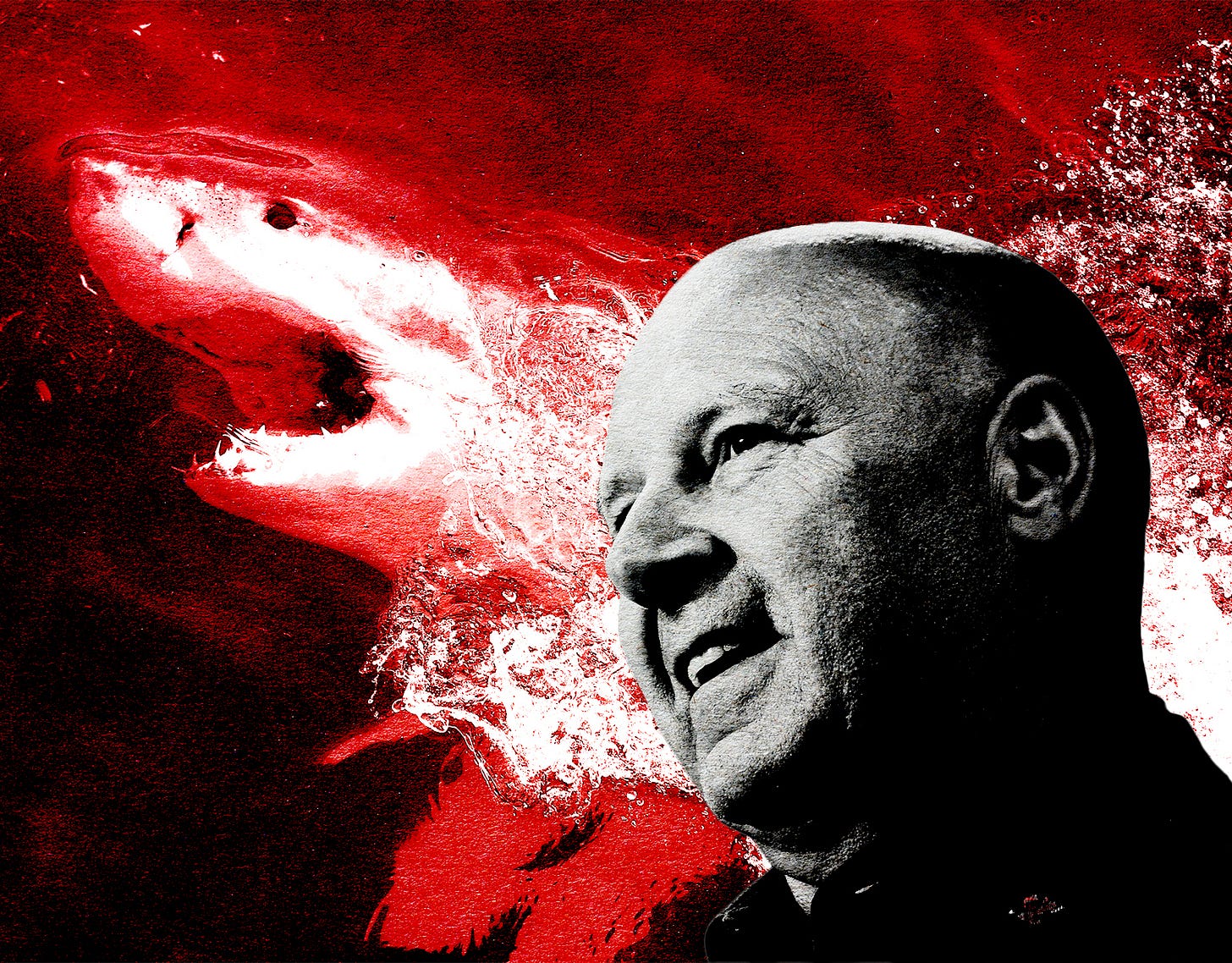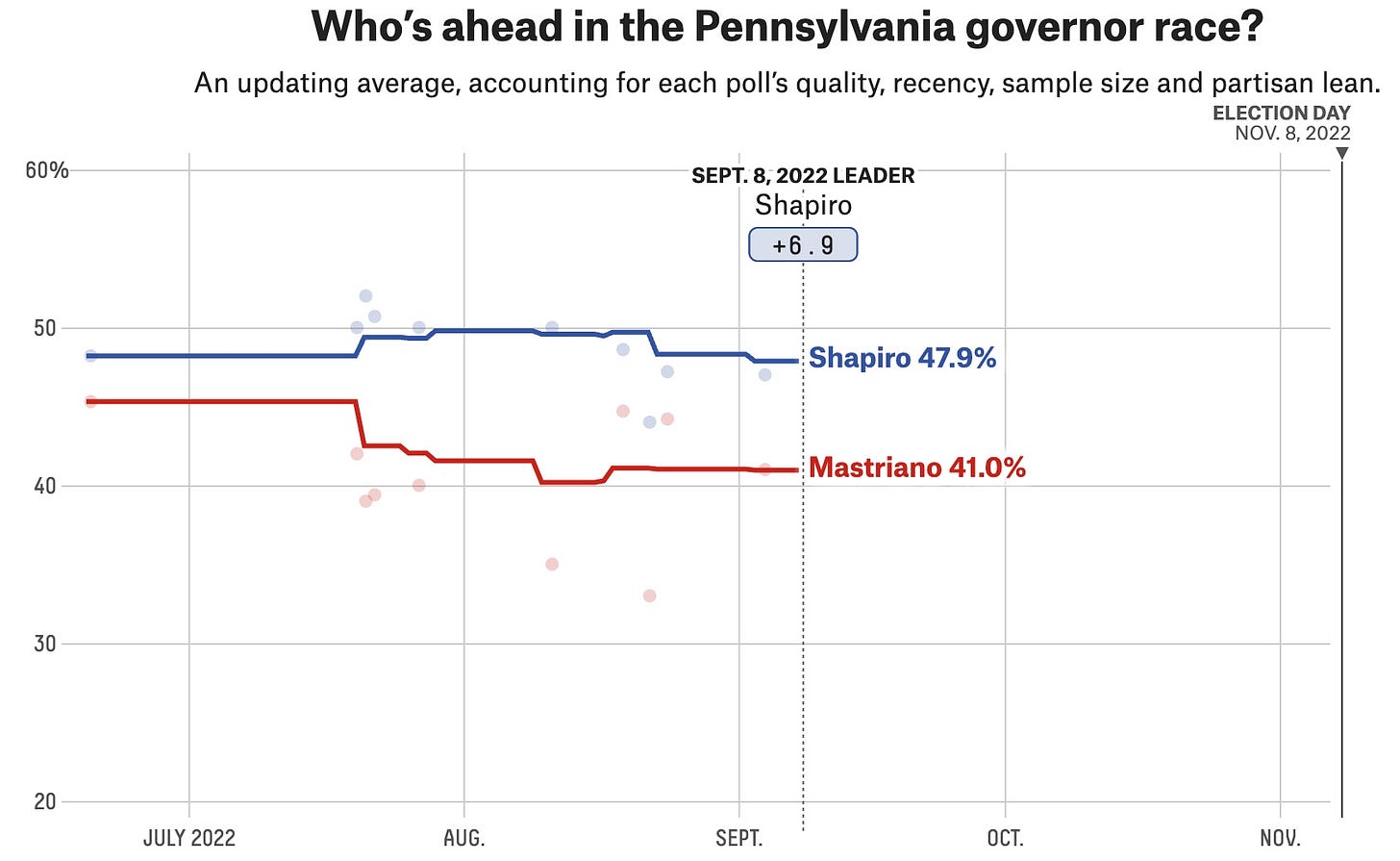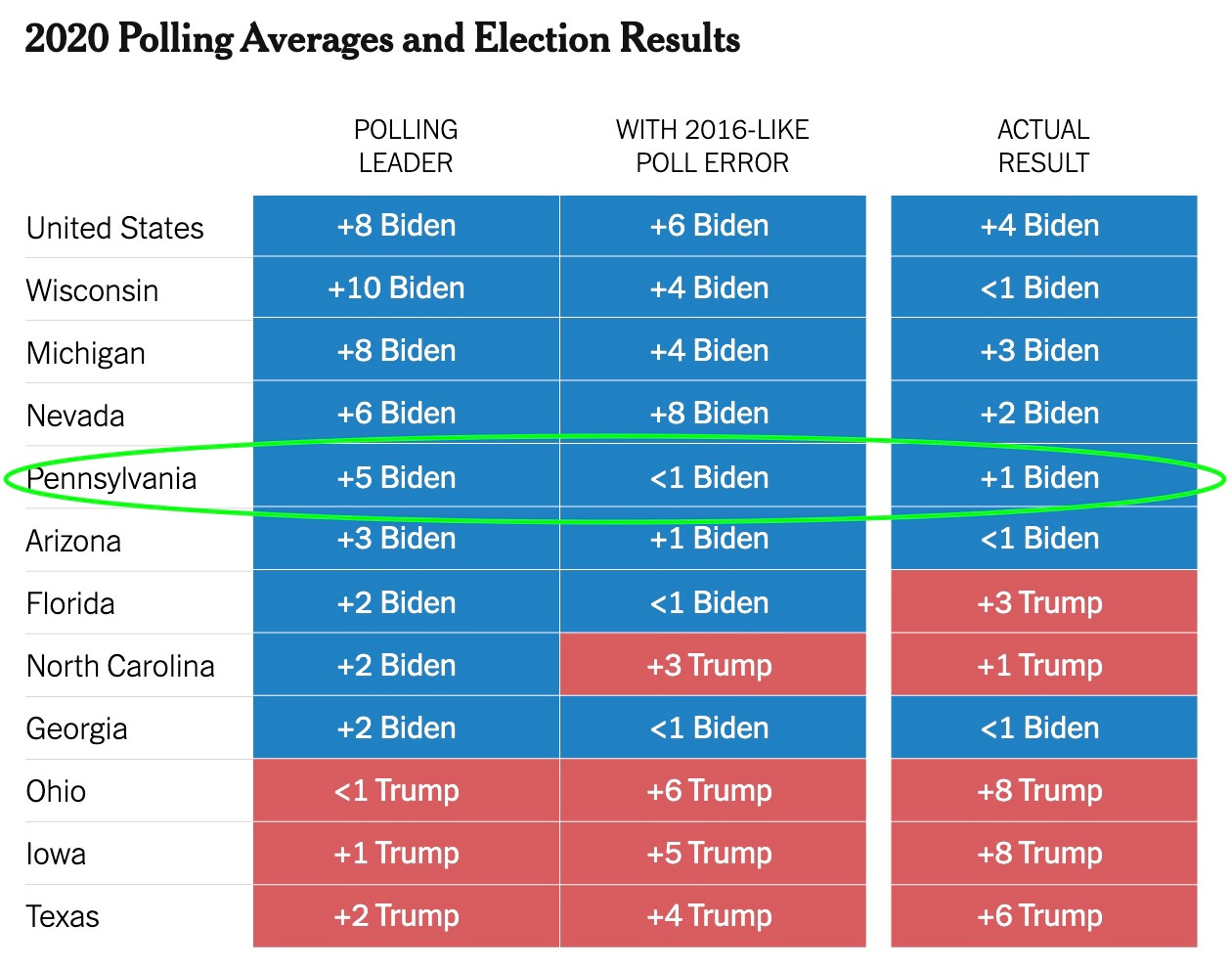A couple weeks ago I suggested that Everything Is Coming Up Brandon. Axios now has an item on “Biden’s Lucky Streak.”
What today’s Triad presupposes is: What if it’s not?
Let’s go dark. It’s going to be a bit of a journey though.
1. A Fifty-Foot Shark
Twenty-five years ago Zak Penn wrote one of the best spec scripts I’ve ever read. It was called Suspect Zero and it was about a serial killer who kills other serial killers.1
In the story, a hotshot young FBI agent is pursuing a seemingly random string of murders, trying to find some pattern. He consults a professor of criminal psychology who hits him with the theory of “Suspect Zero.” The professor begins his disquisition by asking the agent if he’s ever seen a fifty-foot shark. The agent looks at him, confused. The professor continues:
I assume the answer is no. The largest predatory shark ever caught was twenty-four feet. But does that mean a fifty-foot shark does not exist? A group of biologists tried to answer this question. You see, sharks only come near humans if they run out of food. For a fifty foot shark, the ocean would be a never-ending buffet table. He could feed off whales, octopus; he’d never have any need to surface or come to shore. So these biologists decided that if there was a fifty-foot shark, we would never know about it. And as a result of this conclusion, these scientists decided that there are fifty-foot sharks. We just never see them.
Suspect Zero is a similar theory. It posits that if a serial killer were smart enough and had the means at his disposal, he could conceivably kill for an indefinite period of time without being caught. Swimming under our radar, so to speak.
Because we have not seen a thing does not mean that the thing is impossible.
We have never seen a campaign for high office like Doug Mastriano’s. For that matter, we’ve never seen a candidate for high office like Mastriano.
That’s the point my buddy Chris Cillizza made yesterday:
Mastriano . . . doesn’t appear to have any interest in hedging any of his positions or doing any sort of outreach to groups beyond his hardcore base of supporters. Quite the opposite, in fact.
A recent article from the Philadelphia Inquirer makes plain just how different the campaign that Mastriano is running really is. Here’s the key bit:
“As he tours the Commonwealth, Mastriano has essentially walled himself off from the general public, traveling within a bubble of security guards and jittery aides who aim to not only keep him safe, but ensure he only comes into contact with true believers” . . .
Mastriano also rarely engages with any media that is not overtly friendly to him. He conducts Facebook Live events and does interviews in places like the One America News Network but simply refuses to talk to any more mainstream outlets. . . .
Mastriano is also being drastically outspent on television ads by his Democratic opponent, state Attorney General Josh Shapiro. According to Axios, Mastriano has yet to spend any—yes you read that right—money on TV ads for the general election campaign. . . .
Sticking to your beliefs is one thing. Making zero attempt to grow your voter coalition—especially in a state where the GOP base is not even close to a majority (Pennsylvania isn’t Idaho after all)—has the whiff of political malpractice.
It’s possible, of course, that Mastriano knows something that the rest of the political world doesn’t. That the guarded, insular and entirely base-focused campaign he is running will work.
Have you ever seen a fifty-foot shark?
Let’s pretend that I tell you that the most extreme, openly Christian nationalist candidate in living memory is running for governor as a Republican. That this guy has never won a statewide race before. That he’s running in a state Joe Biden won by a point. That the sitting governor of this state is a popular Democrat. That his Democratic opponent in the gubernatorial race is a replacement-level pol who has won statewide twice as a tough-on-crime attorney general.
And finally that this Christian nationalist Republican candidate had spent $0.00 on TV ads.
What would you guess the polling on this race would look like? Would your guess look like this?
On the one hand: Seven points isn’t nothing and Shapiro is running ahead of Biden’s 2020 margin.
On the other hand: Surely the name-ID and TV ad advantage Shapiro holds are worth a handful of those points all on their own.
And how confident are you that polls are adequately capturing Mastriano’s support? After all, his entire campaign is based on the idea that he is going to reach a bunch of people who exist outside the current political dynamic and bring them out with his shofar army.
Speaking only for myself, I am not confident at all.
2. Polls
I’m not the only one. Over at the NYT, Nate Cohn sounded the alarm by putting together a little table. On the left was the 2020 polling leader. Then Cohn applied the 2016 polling error to the 2020 polling numbers. And then he gives you the actual 2020 result. Have a look at what that gives you in Pennsylvania.
After some numbers crunching, Cohn concludes:
It raises the possibility that the apparent Democratic strength in Wisconsin and elsewhere is a mirage—an artifact of persistent and unaddressed biases in survey research.
I have a great deal of sympathy for pollsters, because in some of these cases—for instance, Mastriano voters—they’re looking for fifty-foot sharks: People who haven’t shown up in polling before because they haven’t ever had a candidate who speaks exactly to them before.
The other day Republican pollster Patrick Ruffini made an interesting point:
In the two specific cases Ruffini mentions there are obvious explanations: Lake is stronger than Masters because she’s been a local celebrity in Arizona for a generation. Meanwhile, Mastriano and Oz are both at -7. But of the two, Mastriano is generally regarded as less electable. Why? Because he’s running against a replacement-level D while Oz is running against a great candidate who is in the process of building a national movement.
So Ruffini is wrong in these particulars, but his larger point is correct in two ways.
First, in the general election, being a Republican who refuses to accept the 2020 results is not disqualifying.
Election-denying candidates will win some races and lose others. In each case, the idea that they support(ed) a coup will be just one issue among many. It does not render them untouchable or toxic.
Consider a counterexample: Imagine 9/11 truthers running for office between 2001 and 2012. That would have made a candidate toxic. Someone running for office in 2004 who maintained that 9/11 was an inside job would have been 100 percent beyond the pale. No one would touch them. They would have finished with 25 percent of the vote and their own party would have actively campaigned against them.
But insisting that Donald Trump is the rightfully elected president in 2022 is largely acceptable to large swaths of the electorate.
Actually, that doesn’t go far enough:
In many races, accepting the 2020 results is toxic for Republicans.
You may have seen this piece of reporting in which 538 asked every Republican running for office this cycle about 2020:
Admitting that the 2020 results were correct is the minority position among Republican candidates. And that’s because doing so, in many states and/or districts, would make them flatly unelectable.
One of the numbers I’ll be looking for in November is how those 71 Republican candidates—the “fully accept 2020” people—do.
My theory is that they’ll actually do worse than the election deniers. Because accepting the 2020 election will cost them more among Republican base voters than disputing the 2020 election will cost denier candidates among swing voters.
What all of this gets to is the size of the shark. How big is the universe of these people out there? The people who are pro-coup. Who want Christian nationalism. Who view the Youngkin Option as a scam. Who want Mastriano and RonJohn and all the rest.
I don’t think we know. And I don’t think we’re going to like it when we find out.
Let me ask you this: How reassured would you be if Doug Mastriano loses by 7 points? Would you think that the most important takeaway from such a result would be that he lost?
Or would you think it was important to understand that more than 40 percent of the electorate wanted what Mastriano was offering?
3. The Will To Fight
Aeon looks at the history of resistance:
Throughout history, the most effective combatants, revolutionaries and insurgents have been ‘devoted actors’ fused together by dedication to non-negotiable ‘sacred values’ such as God, country or liberty. Military incursions nearly always plan for maximum force at the beginning to ensure victory. But if defenders resist, or are allowed to recoup, then the advantage often shifts to those with the will to fight as they increasingly harness resources against their attackers who are maxed-out in terms of what they are able, or willing, to commit: consider Napoleon and then Hitler and their onslaught against Russia, or the United States’ invasions of Iraq and Afghanistan. Throughout history, those willing to sacrifice for cause and comrades, and for their leaders, have often prevailed against more powerful forces that mainly rely on material incentives such as pay and punishment. . . .
In testimony before Congress this March, Lieutenant General Scott Berrier, director of the US Defense Intelligence Agency, acknowledged misjudging Ukraine’s ability to resist Russia: ‘I questioned their will to fight. That was a bad assessment …’ . . .
Misjudging both allies’ and adversaries’ will to fight has become routine among military and political decision-makers, with often disastrous results for the planners and their publics. Addressing Congress in September 2021, General Mark Milley, chairman of the US Joint Chiefs of Staff, blamed ‘strategic failure’ in Afghanistan on neglecting the ‘intangible’ factor in war: ‘We can count the trucks and the guns and the units and all that. But we can’t measure a human heart from a machine.’ As the US president Joe Biden put it in August 2021: ‘We gave [Afghan forces] every tool they could need … What we could not provide them was the will to fight …’
When government agencies discuss the will to fight, the little data they mention involves public opinion polls (where, in fact, some polls monitored by the US State Department’s Bureau of Intelligence Research did indicate that Ukrainians would strongly resist). Although pollsters often claim to use ‘scientific methodology’, there is little science in the techniques most of them use. And seldom do the polls assess levels of intensity and behaviour related to the opinions proffered.
Of course, survey questionnaires can provide scientific insight if structured in ways that allow hypothesis testing, including the relationship between responses and actual patterns of behaviour – an approach embraced by academia but usually absent from standard ‘assessment tools’ used by the US departments of State and of Defense, as well as UK and EU government agencies, in evaluating foreign populations. In fact, recent scholarship shows that the ‘will to fight’, at least in part, can be discretely measured and used to predict behaviour. Findings are clear, but uptake by the many officials and agencies who solicit briefings from my research team is constrained by fear of expending lives and money in vain over relatively short time horizons: that is, everything the sacred and spiritual are not.
This was before Dexter and the movie that was eventually made from the Suspect Zero script is awful. It’s a case study in how the development process can go wrong.








The PA GOV race reminds me of the old Sagan quote: "They laughed at Columbus, they laughed at Fulton, they laughed at the Wright Brothers. But they also laughed at Bozo the Clown." The Mastriano campaign is built on testing whether he's part of the former group, or the latter.
My theory: there's a significant subset of the electorate who vote on diffuse but strongly-held inclinations. Barack Obama is a smart, nice man, so I like him. Donald Trump is a tough fighter, so I like him too. Kari Lake is that nice lady from the TV. Hilary Clinton is a robotic grifter. Doug Mastriano is that nut who has the facebooks. Oz is a Jerseyite carpetbagger. The narratives are hard to crack, because the people who hold them aren't engaged in the process. They gather *just* enough information to decide, and then check out. You have to find a way to grab their attention and shape the story they're telling themselves, preferably early, because getting them to reconsider it will take a catastrophe.
My suspicion is that the overturn of Roe was such an event for a lot of them. We miss just how much it shaped things, because we're nerds, so we're always paying attention. We saw it coming. But a lot of people genuinely thought that it was a categorical impossibility. Now they know it's not, so they're looking again. And the more people like Lindsay Graham do to make them question how solid their understanding of the world is, the more they're going to question.
My question is if a possible 40% of the electorate questions the legitimacy of the 2020 election, what will happen if the Mastrianos and Lakes and Tudors lose? Will they quietly accept the outcome or will they expand their outrage, threatening violence and revolution?
Their extremism is normalized.